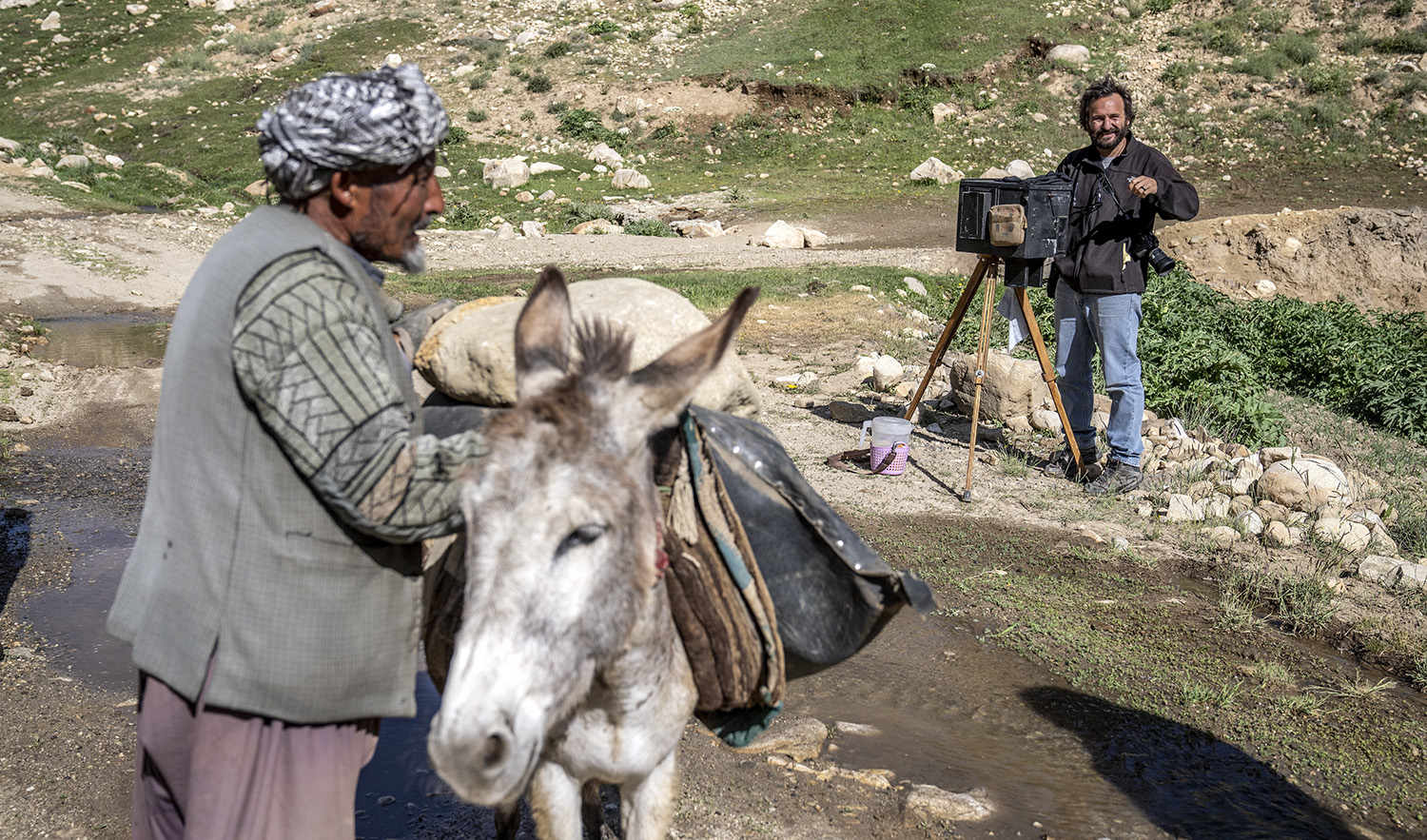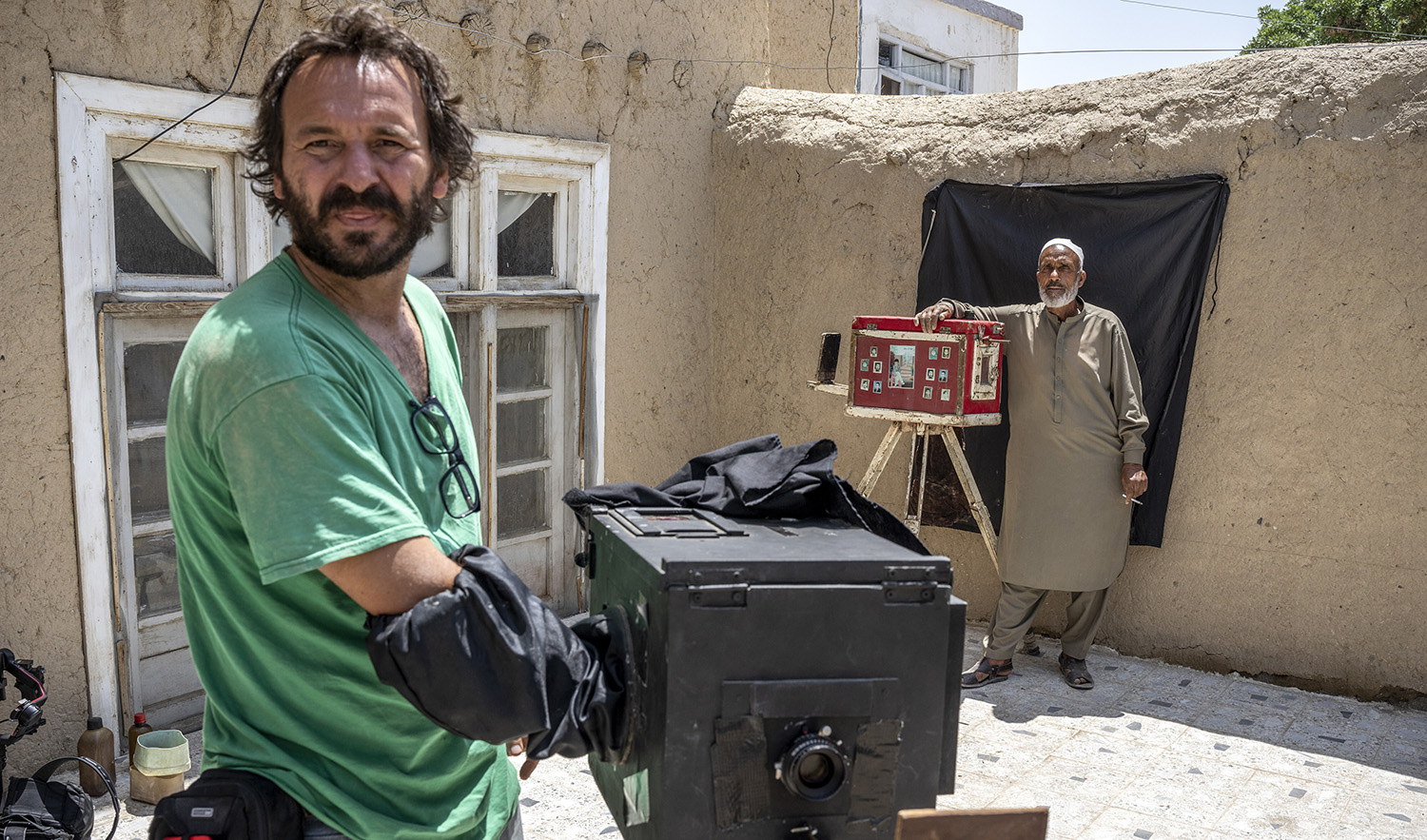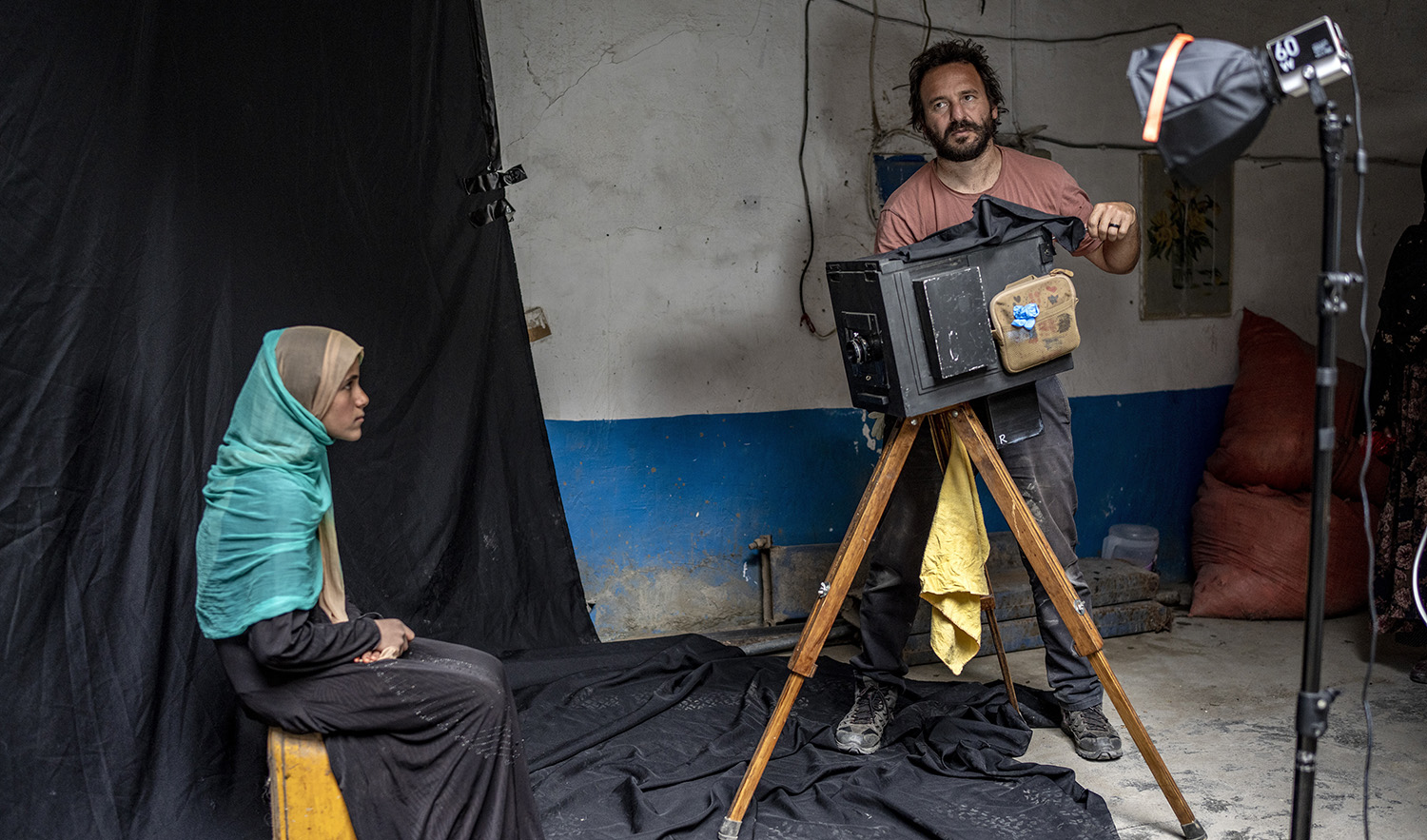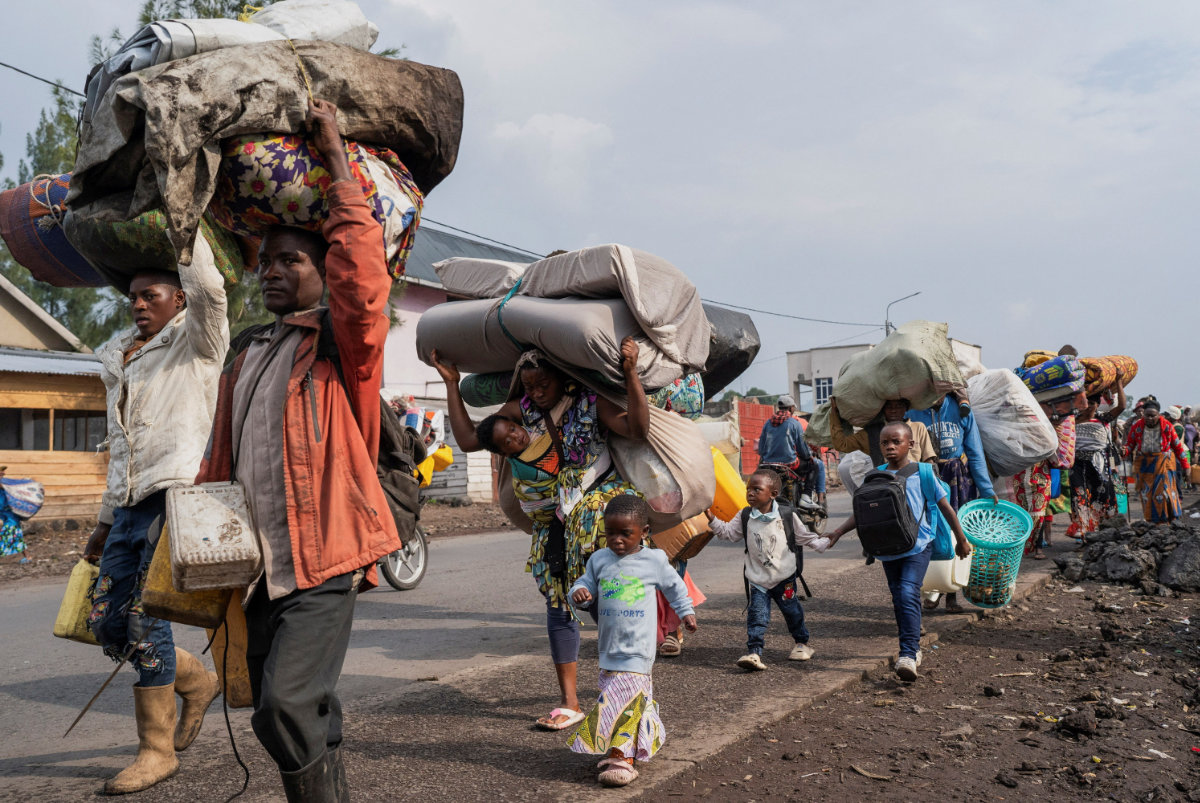KABUL, Afghanistan: The odd device draws curious onlookers everywhere. From the outside, it resembles little more than a large black box on a tripod. Inside lies its magic: a hand-made wooden camera and darkroom in one.
As a small crowd gathers around the box camera, images of beauty and of hardship ripple to life from its dark interior: a family enjoying an outing in a swan boat on a lake; child laborers toiling in brick factories; women erased by all-covering veils; armed young men with fire in their eyes.
Sitting for a portrait in a war-scarred Afghan village, a Taliban fighter remarks: “Life is much more joyful now.” For a young woman in the Afghan capital, forced out of education because of her gender, the opposite is true: “My life is like a prisoner, like a bird in a cage.”
The instrument used to record these moments is a kamra-e-faoree, or instant camera. They were a common sight on Afghan city streets in the last century — a fast and easy way to make portraits, especially for identity documents. Simple, cheap and portable, they endured amid half a century of dramatic changes in this country — from a monarchy to a communist takeover, from foreign invasions to insurgencies — until 21st-century digital technology rendered them obsolete.
Using this nearly disappeared homegrown art form to document life in post-war Afghanistan, from Herat in the west and Kandahar in the south to Kabul in the east and Bamiyan in the center, produced hundreds of black-and-white prints that reveal a complex, sometimes contradictory narrative.
Made over the course of a month, the images underscore how in the two years since US troops pulled out and the Taliban returned to power, life has changed dramatically for many Afghans — whereas for others, little has changed over the decades, regardless of who was in power.
A tool of a bygone era, the box camera imparts a vintage, timeless quality to the images, as if the country’s past is superimposed over its present, which in some respects, it is.
At first glance the faded black-and-white, sometimes slightly out-of-focus images convey an Afghanistan frozen in time. But that aesthetic is deceiving. These are reflections of the country very much as it is now.
AN UNEASY RELATIONSHIP WITH THE CAMERA
During their first stint in power from 1996 to 2001, the Taliban banned photography of humans and animals as contrary to the teachings of Islam. Many box cameras were smashed, though some were quietly tolerated, Afghan photographers say. But it was the advent of the digital age that sounded the device’s death knell.

Associated Press photographer Rodrigo Abd takes a portrait of a man and his pack animal with a wooden box camera in Bamiyan, Afghanistan, on June 16, 2023. (AP/File)
“These things are gone,” said Lutfullah Habibzadeh, 72, a former kamra-e-faoree photographer in Kabul. “Digital cameras are on the market, and (the old ones) are out of use.” Habibzadeh still has his old box camera, a relic of the last century passed down to him by his photographer father. It no longer works, but he has lovingly preserved its red leather coating, decorated with sample photos.
On Afghan city streets today, billboard advertisements have faces spray-painted out, and clothing store windows display mannequins with their heads wrapped in black plastic bags, to adhere to the renewed ban on the depictions of faces.
But the advent of the Internet age and of smartphones have made a ban on photography impossible to impose. The novel sight of an old box camera elicits excitement and curiosity – even among those who police the new rules. From foot soldiers to high-ranking officials, many Taliban were happy to pose for box camera portraits.

Associated Press photographer Rodrigo Abd takes a portrait of Lutfullah Habibzadeh, 72, who uses a similar wooden box camera, in Kabul, Afghanistan, on May 31, 2023. (AP/File)
Outside a warehouse in Kabul, a group of men watch intently as the camera is set up. At first, they seem shy. But as the first portraits emerge, curiosity overtakes their reservations. Soon, they’re smiling and joking as they wait to have their photos taken, pitching in to help when a black cloth backdrop slips off the wall. As each man steps forward for his portrait, set jaws replace tentative smiles. Adjusting their grip on their assault rifles, they look straight into the camera’s tiny lens and hold their poses.
Most of these men joined the Taliban as teenagers or in their early 20s and have known nothing but war. They were drawn to the fundamentalist movement because of their fervent Muslim faith – and their determination to expel US and NATO troops who invaded their country and propped up two decades of Afghan governments that failed to crack down on rampant corruption and crime.
Bahadur Rahaani, a 52-year-old Taliban member with piercing light blue eyes beneath his black turban, says he’s happy to see the Taliban back in power. With them in government, “Afghanistan will be rebuilt,” he says. “Without them, it is not possible.”
PEACE, AT A PRICE
Two years after Taliban militias swept across the country to seize power again, there are strong echoes of life as it was before US-led NATO forces toppled them from government in 2001.
Once more, the country is ruled by a fundamentalist movement that has restored many of the strict rules it imposed in the 1990s. The first Taliban regime was notorious for destroying art and cultural patrimony it deemed un-Islamic, such as the giant ancient buddhas carved into cliffs in Bamiyan. They imposed brutal punishments, chopping off hands of thieves, hanging supposed blasphemers in public squares and stoning women accused of adultery.
Once again, executions and lashings are back. Music, movies, dancing and performances are banned, and women are again excluded from nearly all public life, including education and all but a few professions.
The return to fundamentalist policies has chased away Western donors, aid workers and trade partners. Poverty has spiraled to crisis levels, fueled by the ban on women working, deep cuts in foreign aid and international sanctions. But there is nearly universal relief that the relentless bloodshed of the past four decades of invasions, multiple insurgencies and civil war has largely ceased.
There are still sporadic bombings, most attributed to enemies of the Taliban, the extremist group Islamic State-Khorasan Province, or IS-K. But Afghans interviewed say their country is more peaceful than they’ve known for decades.
The United Nations recorded 1,095 civilians killed in deliberate attacks between Aug. 15, 2021, when the Taliban reclaimed power, through May 30, 2023. That’s a fraction of the annual civilian death toll over two decades of war between US-led NATO forces and insurgents.
Even those who dislike the current regime say banditry, kidnapping and corruption, which were rampant under the previous governments, have been largely reined in.
But less crime and violence does not necessarily translate to prosperity and happiness.
WOMEN, ERASED
In a three-story building tucked in a Kabul alleyway, a group of women work silently at a loom. Zamarod’s hands move swiftly, nimble fingers flitting between strands of yarn as she knots colored wool around them, making a carpet. Her movements are rapid, almost brusque, but her voice is soft and sad. “My life is like a prisoner,” she says. “Like a bird in a cage.”
The 20-year-old had been studying computer science, but the Taliban banned women from universities before she could graduate. Now she and her 23-year-old sister work in a carpet factory, falling back on a skill their mother taught them as children. They are among very few women who can earn money outside the home and, like others, asked that only their first names be used for fear of retribution for speaking out.

Associated Press photographer Rodrigo Abd takes a portrait of a girl in a carpet factory, with a wooden box camera, in Kabul, Afghanistan, on May 29, 2023. (AP/File)
Women have experienced the starkest changes since the Taliban’s return. They must adhere to a strict dress code, are banned from most jobs and denied simple pleasures such as visiting a park or going to a restaurant. Girls can no longer attend school beyond sixth grade, and women must be escorted by a male relative to travel.
For all intents and purposes, women have been being erased from public life.
Even in this environment, Zamarod hasn’t given up on her dream of graduating. “We have to have hope. We hope that one day we will be free, that freedom is possible,” she says. “That’s why we live and breathe.”
In another room, 50-year-old Hakima is introducing her teenage daughter Freshta to weaving. It is their only way of eking out a living, though she still dreams her 16-year-old daughter will someday become a doctor. “Afghanistan has gone backwards,” she says, donning an all-encompassing burka to pose for a portrait. “People go door to door for a piece of bread and our children are dying.”
While the clock has turned back for women who’ve lost financial independence and a voice in public life and government, in conservative, tribal parts of the country, expectations for women have always been different and have changed little over the years — even during US and NATO military presence.
Even so, education is a priority for many Afghans. In dozens of interviews across the country, nearly everyone — including some members of the Taliban — said they wanted girls and women to be educated. Most said they believed the education ban was temporary, and that older girls would eventually be allowed back into schools. They say keeping girls and women confined at home doesn’t help the country, or its economy.
“We need doctors, teachers,” says Hajji Muhibullah Aloko, a 34-year-old teacher in the village of Tabin, west of Kandahar. Women must be educated “so that Afghanistan improves in every sector.”
The international community has withheld recognition of the Taliban and pressed its leadership to roll back their restrictions on women — to no avail.
“That is up to Afghans and not foreigners, they shouldn’t get involved,” Taliban government spokesman Zabiullah Mujahid says during an interview in Kandahar, the birthplace of the movement in southern Afghanistan and a stronghold of conservative values.
“We are waiting for the right moment regarding the schools. And while the schools are closed now, they won’t be forever,” he says. He won’t give a timeline but insists “the world shouldn’t use this as an excuse” not to recognize the Taliban government.
VICTORIOUS INSURGENTS
The village of Tabin lies deep in the Arghandab River valley, a fertile swath of fruit orchards and irrigation canals cutting through Kandahar Province’s dusty desert.
But around it, the remnants of war are everywhere. The derelict remains of American combat outposts have faded warnings of mines and grenades spraypainted on their wind-blown blast walls. Tangles of abandoned razor wire litter the ground. Bombed-out houses lie in ruins. And there’s the ubiquitous presence of armed young men adjusting from a life of fighting to one of living in peace.
The new jobs — policing streets, guarding buildings, collecting garbage — are the mundane, necessary tasks of governing. It’s less dramatic than waging war, but there is palpable relief to be free of the violence.
Without fear of airstrikes or bullets, children shriek in delight as they splash about in an irrigation canal, leaping into the murky water from a bridge.
“Life is much more joyful now. Before there used to be lots of brutality and aggression,” 28-year-old Abdul Halim Hilal says, sheltering from the blazing sun under a mulberry tree before posing for a portrait. “Innocent people would die. Villages were bombed. We couldn’t bear it.”
He joined the Taliban as a teenager, believing it was his moral duty to fight foreign troops. He lost as many as 20 friends to the war, and more were wounded. He’s stung by the memory of his dead brothers-in-arms when he sees their fatherless children, but he’s comforted by an unshakeable belief that their sacrifice was worth it.
“The ones that were killed were fighting to sacrifice themselves for the country,” he says. “It’s because of the blood they gave that we’re now here, giving interviews freely, and the Muslims here are living in peace.”
A villager walks by, glancing at the gaggle of curious children and adults gathered around the box camera. “It’s so strange,” he mutters. “We used to fight against these foreigners, and now they’re here taking pictures.”
Mujeeburahman Faqer, a 26-year-old Taliban fighter, now mans an uneventful security checkpoint in Kabul. Like many others, he’s struggling to adapt to a peacetime mentality, because all he’s ever known was war. “I had prepared my head for sacrifice,” he says, “and I am still ready.”
A FOUNDERING ECONOMY — AND A STRUGGLE TO SURVIVE
Security has improved since the end of the insurgency against US forces. But with peace came an economy in freefall.
When the Taliban seized power again in 2021, international donors withdrew funding, froze Afghan assets abroad, isolated its financial sector and imposed sanctions.
That squeeze, combined with the near-total ban on women working, has crippled the economy. Per capita income shrank by an estimated 30 percent last year compared to 2020, according to the United Nations Development Program.
Nearly half of Afghanistan’s 40 million people now face acute food insecurity, the UN’s World Food Program says. Malnutrition is above emergency thresholds in 25 of 34 provinces.
Struggling to survive is something Kasnia already knows at age 4. In a brick factory outside Kabul, she scoops out a chunk of mud with her tiny hands, kneading it until it is pliable enough for a brick mold. After countless repetitions, her movements are automatic. She works six days a week from sunrise until sunset, with brief breaks for breakfast and lunch, toiling next to her siblings and her father — one family among many in a sprawling factory where children become laborers at age 3.
“Everyone wishes that their children study and become teachers, doctors, engineers, and benefit the future of the country,” says her father, Wahidullah, 35, who goes by one name, as do his children.
Even with the entire family working, there’s often not enough money for food and they live hand to mouth on credit from shopkeepers. Of his three sons and three daughters, all except the youngest one are brickmakers.
“When I was young, my dream was to have a comfortable life, to have a nice office, to have a nice car, to go to parks, to travel around my country and abroad, to go to Europe,” he recalls. Instead, “I make bricks.” There is no bitterness in his voice, just acceptance of an inevitable fate.
Many Afghans have resorted to selling their belongings — everything from furniture to clothing and shoes — to survive.
When the Taliban banned movies, Nabi Attai had nothing to fall back on. In his 70s, the actor appeared in a dozen television series and 76 films, including the Golden Globe-winning 2003 movie “Osama.” Now he is destitute.
His home, tucked in a warren of steep alleys, is now nearly devoid of furniture, which he sold in the bazaar to feed his extended family. Sold, too, is his beloved TV.
After 42 years of acting, Attai has no work. Neither do his two sons, who were also in the movie and music business. Attai is glad the streets are now safe, but he has 13 family members to feed and no way to feed them.
He asked local authorities for any job, even collecting garbage. There was nothing. So he started selling his belongings. “I have no hope right now,” he says. Even begging is now punished by imprisonment under the Taliban.
Over the past year, he has become frail. His cheeks are sunken, his frame thinner. There’s a sadness in his eyes that rarely leaves, even when he recounts his glory days.
“We made good movies before,” he says. “May God have mercy that music and cinema will be allowed again, and the people will rebuild the country hand in hand, and the government will come closer to the people and embrace each other as friends and brothers.”
PINPRICKS OF GLITZ
The shimmering lights of wedding halls cut through the gloom as night encroaches on Kabul, pinpricks of glitz in the darkness.
Despite the economic slump, wedding halls are doing a brisk trade, buoyed in part by wealthier Afghan emigres returning home for traditional marriage ceremonies now that the security situation has improved.
Weddings are a big part of Afghan culture, and families sometimes bankrupt themselves to ensure a lavish party for hundreds or even thousands of guests.
Construction of the Imperial Continental wedding hall began four years ago but was disrupted by the COVID pandemic and the Taliban takeover. The opulent venue finally opened its doors last year.
Manager Mohammad Wesal Quaoni, 30, cuts a dapper figure in a sharp suit as he sweeps through the glamorous, cavernous halls, juggling four weddings in one night. The former Kabul University lecturer in economics and politics is trying to ensure the business thrives amid the country’s economic woes. It’s not easy.
“Business is weak,” he says, and onerous government rules and regulations don’t help. The Taliban are raising taxes, but he says there isn’t enough commerce to support a healthy tax base.
The ban on music and dancing doesn’t help. Gone are the live musicians and even the DJs who would bring in extra revenue, Quaoni says. Weddings are segregated by gender but, for once, there’s sometimes a bit more fun for the women.
Occasionally women and girls enjoy taped music in the ladies’ section. “If they want, they do it,” restrictions or not, he said. “Women will be women.”
Five hundred miles west of the capital, on the outskirts of the city of Herat, businessman Abdul Khaleq Khodadadi, 39, has an entirely different set of challenges.
Rayan Saffron Company, where he is vice president, exports the prized spice to customers, mainly in Europe and the US But the Taliban takeover and ensuing sanctions left many foreign clients reluctant to do business with an Afghan company – even though it’s one of the few still allowed to employ women, whose hands are deemed more suitable than men’s to extracting and handling the delicate crocus flowers.
The isolation of the banking sector has also left many Afghan companies with no way to trade except through a third country, usually Pakistan, which significantly increases costs. Then there’s drought that has decimated crops, including saffron.
His company had aimed to increase their production this year. Instead, their production fell to half of what it was three years ago, he says.
Khodadadi says he is determined to persevere. For him, successful businesses are the best way to heal Afghanistan’s wounds.
In the chaotic early days of the Taliban takeover, Khodadadi felt intense pressure to join the tens of thousands of people who fled, he says. He had a visa and family and friends urged him to leave, but he refused to go.
“It was very, very hard,” he recalls. “But ... if I leave, if all the talented people, educated people leave, who will make this country? When will this country solve the problems?”



























